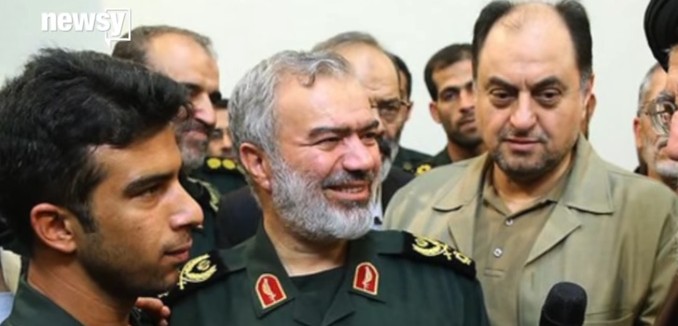The commander of Iran’s elite extraterritorial navy proclaimed in a session at the Iranian parliament Monday that his forces “extracted a lot of information from the confiscated cell phones and laptops” from U.S. Navy sailors it detained last month.
Rear Admiral Ali Fadavi, the commander of the Islamic Revolutionary Guards Corps (IRGC) navy, said that the IRGC possesses additional footage of the capture of two American naval boats and their ten crew members. According to Tasnim News, a website affiliated with the IRGC, Fadavi said that releasing the footage would bring “humiliation” to the United States, and American officials would be “100 times more embarrassed” than they already are.
Javadi’s claim of additional videos that could cause humiliation to the United States comes in light of growing concern over how the American sailors were treated by the Iranians. The Third Geneva Convention states that prisoners of war are to be protected “against acts of violence or intimidation and against insults and public curiosity.” While the United States and Iran are not officially at war, James Ross, legal and policy director of Human Rights Watch, told The Wall Street Journal last month that “while the Geneva Conventions may not formally apply here, the Iranian government actions would appear to be contrary to the intention of the Geneva Conventions.”
A similar case was made after Iran captured 15 British sailors and marines in 2007 and showed footage of them on TV. The British government asserted at the time that the broadcasting of their images breached the Third Geneva Convention.
Sen. John McCain (R – Ariz.), a former navy officer who was a prisoner of war in Vietnam and is now chairman of the Senate Armed Services Committee, said last month that “under international law, sovereign immune naval vessels are exempt from detention, boarding, or search. Their crews are not subject to detention or arrest.” Rep. Mike Pompeo (R – Kan.) has called for an investigation whether Iran’s broadcast of the sailors violated the Geneva Conventions.
Bill Luti, vice president of the Hudson Institute, said in a panel discussion two weeks ago that “it appears the seizure by the Iranians violates several, if two or three, well-established principles of international and maritime law. The first one being, of course, being innocent passage, where ships of all states, whether coastal or landlocked, have the right of innocent passage through territorial waters… [second,] the sovereign immunity of warships… [and the] third principle, while we’re not technically at war with Iran, [is] the 1949 Geneva Conventions and the Protocol 1 and 2 of 1977, which clearly prohibit the filming, photographing or otherwise using videotaped or audio-taped confessions or apologies for propaganda purposes.”
Iranian Supreme Leader Ayatollah Ali Khamenei said last week that the seizure of the sailors was “God’s deed.” He awarded the naval commanders who were in charge of the seizure the Victory Medal on Sunday. The commander of the IRGC operation that seized British sailors was decorated as “soldier of the year” in 2007.
[Photo: Newsy World / YouTube ]




